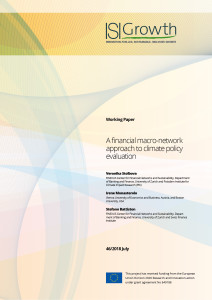Existing approaches to assess the economic impact of climate policies tend to overlook the financial sector and to focus only on direct effects of policies on the specific institutional sector they target, neglecting possible feedbacks between sectors, thus, underestimating the overall policy effect. To fill in this gap, we develop a methodology based on financial networks, which allows for analyzing the transmission throughout the economy of positive or negative shocks induced by the introduction of specific climate policies. We apply the methodology to empirical data of the Euro Area to identify the feedback loops between the financial sector and the real economy both through direct and indirect chains of financial exposures across multiple financial instruments. By focusing on climate policy-induced shocks that affect directly either the banking sector or non-financial firms, we analyze the reinforcing feedback loops that could amplify the effects of shocks on the financial sector and then cascade on the real economy. Our analysis helps to understand the conditions for virtuous or vicious cycles to arise in the climate-finance nexus and to provide a comprehensive assessment of the economic impact of climate policies.
Industrial and Technological Policy (ITP) and Divergence in Comparative Perspective: Latin America and Asia
Veronika Stolbova
FINEXUS Center for Financial Networks and Sustainability, Department of Banking and Finance, University of Zurich and Potsdam Institute for Climate Impact Research (PIK)
Irene Monasterolo
Vienna University of Economics and Business, Austria, and Boston University, USA
Stefano Battiston
FINEXUS Center for Financial Networks and Sustainability, Depart- ment of Banking and Finance, University of Zurich and Swiss Finance Institute

